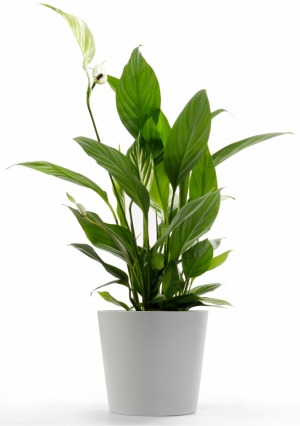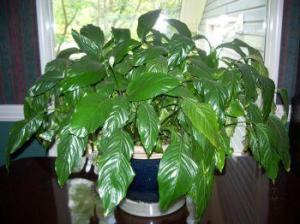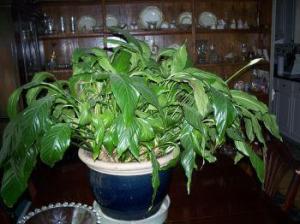 Need info on how to get my peace lily to bloom. mariew
Need info on how to get my peace lily to bloom. mariew
Do not overwater, and peace lilies like low light. A hi nitogen fertilizer at half strength will encourage blooms.
I let mine show the first signs of "drooping" then I water and it blooms all year. I feed every three months so so.
Jennifer
My Peace Lily hasn't bloomed. In looking into this, I recently learned that some peace lilies are selected more for their foliage, so if yours doesn't bloom, it may be a foliage variety. I also learned that in too little light they will bloom much less, so although they can tolerate low light conditions, they prefer (indirect) light.
I have heard it said that the reason they call them "Peace Lilys" is because they only bloom in peacefull areas.
To get my peace lily to bloom, I used to water it like It should and I put the Miracle-Gro plant spikes into it. It bloomed a lot! And maybe that it does need to be in a peaceful location to bloom. But now it seems like I can't get it to bloom like it used to. And it is in the same location it has been in for 5 years.

Here's another picture of my peace lily! It has one bloom on it!

Our library's 2 beautiful big peace lillies were ove rwatered & then put outside for a few minutes when they over flooded in the library. the temp was about 16 degrees.
We have 2 soggy peace lilies that were put outside to drain for just minutes on a very cold night. They are both totally drooped. Is there a chance to save them?
I would agree with Jennifer, I let my peace lily show the first signs of drooping and then water it. I bought it as quite a small plant and it is now thriving 3 years on!
Everyone that mentions about not overwatering the plant is WRONG. Peace Lilies are actually WATER plants. They can thrive in soil with regular watering OR they can thrive in water. I have two... one is in dirt and I water it weekly and the other I bought, cleaned the dirt carefully off of the roots and it sits in a vase that only has water and decorative clear stones in it.
I went on holiday for a couple of weeks and when I returned home I discovered that my Peace Lily was really drooped and the soil was really dry then I realised I couldn't remember the last time I watered it so I watered it and about 5 hours later it was back to its old self but a couple of days later I discovered a bloom bare in it hadn't bloomed in months and it hasn't had another bloom since and I hope I haven't damaged it
I have a very healty peace plant that had white blooms when I got it but has not since 5 years ago I keep it by a window that has indirect sunlight and it needs a little water once per week.
Mine at work is 3 years old and has gotten so big I had to divide it in order to keep the planters in a place they can get indirect sunlight. Sometimes I over water, sometimes I under water. Either way this is the first time mine has bloomed. It had gotten very dry and then my friend watered it while I was gone on Christmas.
I have had no luck with my Peace Lilly blooming. I have had it for two years now. My mother on the other hand talked to hers everyday and it never bloomed either, so she told it to either bloom or she was going to throw it in the lake, it put on 6 blooms and she told it that it could do better, it put on 21 blooms last summer. WOW I am still waiting on mine to bloom. I threathened to throw mine in the pond, but I think mine know I was kidding. Blooms or no blooms, they are very nice plants.
I have had my peace lily for 8 years now. The only 2 times i got it to bloom was when i had forgotten to water it for ages then when I did it was probably so thankful it produced a flower. Now I don't know what to do as tried that and it doesn't work.
There is a chemical reason your "Peace Lily" is not blooming.
The Peace Lily is an aroid. The genus name is Spathiphyllum and aroids produce their inflorescences depending on the time of year and season nature has predetermined. Some species produce a spathe and spadix only during the dry or wet season in their natural habitat while others freely produce an inflorescence any time of the year. Fortunately, Spathiphyllum bloom year round.
By the way, the white spathe is not a flower. The flowers are microscopic and can be found along the spadix at the center of the inflorescence. The spathe is simply a modified leaf. In the case of aroids the word "bloom" refers to the tiny male and female flowers on the spadix and not the spathe. These very tiny flowers are visible for only a few days immeditely after the inflorescence first opens.
These plants grow naturally in bright indirect light (not a dark corner) and IN WATER! My friend aroid botanist Dr. Tom Croat who knows more about aroids than any living human being calls them "water hogs". Dr. Croat is with the Missouri Botanical Garden and has collected more wild aroids for botanical gardens than any living human being (more than 100,000) and has granted names to thousands of aroid species.
People that claim Peace Lilies should be kept in a dark area of a home and rarely watered do not understand the plants as they survive in the wild. They must be watered regularly to keep them blooming and they need bright light. They will survive in dim light but that is all they will do. Survive!
However, Spathiphyllum must have fast draining soil and not soggy mud in their pot! You must mix peat moss, orchid bark, Perlite, and cut up pieces of sphagnum moss into their soil to keep them happy and blooming.
The commercial growers that produce these plants use a chemical known as gibberellic acid often sold as GA3 to induce the plants to produce an inflorescences in order to make them more sale able at the time a buyer sees one in the store. Gibberellic acid is natural plant hormone and is used in agriculture to stimulate both cell division and cell elongation that affects the leaves as well as stems of a plant. The stem is the base or central axis of the plant and not the stalk that supports any leaf blade. The support for a leaf is the petiole and there is a major difference in a "stem" and a "petiole".
The continued use of GA3 in agriculture eventually affects fruit development. Since the fruit of an aroid is produced on the spadix gibberellic acid thus speeds up the the production of inflorescences.
The big problem with GA3 is the plants become "addicted" to the chemical and if the poor grower that buys the plant does not understand this as well as the fact it will take years for the plant to outgrow the addiction they will soon be disappointed. In most cases it can take one to three years for the plant to out grow the "chemical addiction".
Plants produced for commercial sales are almost always created through tissue culture (cloning) and not grown from seed. Gibberellic acid is used commercially to make all the tissue cultured plants in one group bloom at the same time.
Through repeated use these large growers force the natural growth of a spathe and spadix regardless of season. They have calculated the quantity to be used and know how much gibberellic acid to apply to any particular species but these formulations are often guarded secrets.
An article by Dr. Paul Resslar on the production of an inflorescence of Caladium humboldtii can be found in the IAS journal Aroideana, volume 31, where he discusses the amounts and methods of application used in his research.
In Dr. Resslar's experience the chemical also can result in deformities. Deformity is considered a minor problem in commercial aroid production including double spathes, spadices with strange shapes, malformed leaves and other side effects. One of the side effects may well be the plant becomes dependent on the chemical to induce the production of an inflorescence and flowers. A presentation by aroid enthusiast Ted Held at the 2008 International Aroid Show in Miami pointed out these exact problems.
Discussions on these effects can be found on the International Aroid Society forum Aroid l by searching the archives of the forum on the internet.
Some of the world's best aroid botanists and experts do not find the use of the chemical to be wise. As a result, the use of gibberellic acid by aroid collectors with no experience in chemical use is not advisable and should be used with caution even though it will work. The use is primarily not advised since collectors have no way of knowing how much of the chemical to apply to any particular specimen based on species or size. But there are other problems.
The instructions on some of the containers of GA3 say to apply the chemical near the base of the plant but it also says boldly not to allow the chemical to come in contact with the roots! Some material indicates this may not be accurate but the warning can be found on sometimes on the product itself. Since the roots are at the base of the plant is is obvious the chemical can be dangerous to your plants. Other potential problems stated in papers on the commercial use of GA3 indicate the chemical will increase plant height, slightly reduce leaf width, and soften stems during periods of low light during shorter days. Still, commercial growers love the product because it increases their production and profit.
The next time you buy a beautiful Anthurium or Spathiphyllum at a discount store and find it begins to produce either no blooms or odd shaped leaves and spathes or rarely if ever produces an inflorescence once you get it home there is a reason. The specimen has very likely been fed gibberellic acid since it was nearing sexual maturity to force it to mature and bloom early.
Without the constant use of the hormone to induce inflorescence production the specimen cannot get its "fix" and as a result may rarely bloom again. It has been "hooked" on the chemical! Collectors should consider using the product with extreme caution.
Aroideana is the journal of the International Aroid Society and out of print copies can be ordered at www.aroid.org/
The photo shows some of our "Peace Lilies" happily growing in an aquarium with their roots totally submerged. There are 5 spathes showing in the photo.
You must give the plants regular doses of diluted fertilizer to keep them producing an inflorescence but don't over fertilize and use only distilled water, not tap water. In all cases these plants need to be watered at least two or three times per week, just make sure they have fast draining soil. Keep them near a bright window and not in deep shade.
You can find a complete explanation of how aroids produce their inflorescences on the website beneath my name. Just look for the link on the homepage about Natural Pollination in Aroids.
Steve Lucas
Corresponding Secretary
The International Aroid Society
www.ExoticRainforest.com

I have had my peace lilies for 13 years, every spring I usually put them out on my porch and they usually have 1 or 2 blooms, but this year, I put them out in my yard under an oak tree, and one of them has 13 blooms and the other has 18 blooms, they really love being out side, this is the best year they have ever had. I took a picture, it's not the best but you can see some of the blooms, but not all of them this is the one with 18 blooms.

I have two Peace lilies. Both were over watered while we were away for the winter. They were side by side. One survived (the one I bought from the grocery store), one died (the one from an upscale local florist). The one that survived I let dry out. I only water it when it droops. It is in a room with four windows but no direct sunlight. It hasn't bloomed in two years. My sister in law put her lily outside and the sunlight seemed to kill it. Not sure exactly which tip to take from these messages, but will read through them again. I'm in Massachusetts, not sure which planting zone that is.
I keep my plant in my office. It gets some florescent and indirect sunlight from the window. I water it about twice a week. In addition, I toss banana peels in the soil every now and then. I notice that it blooms after being in the dark over the three day weekends

My peace lily is outside had one bloom when I got it and it grew like a weed but has not bloomed since what can I do to make it bloom?
Maybe true, maybe not...I have 2 peace lillies, 1 with the larger leaves... My peace lillies bloom like crazy.. I had 6 blooms at 1 time... Most ever! Those are dying out, when they turn brown I cut the stem at the base so it won't deplete the energy from the other leaves... In the last few months when all the blooming started, the one change, I started putting used coffee grinds in the soil.. in most of my 60 plants and all of them look better than ever... I also use florescent lighting... U can't go wrong w florescent lighting... and its inexpensive to boot...
looks like you may need to seperate and repot your plant....it's most likely root bound in that pot...
It is probably pot bound. You may need to thin it out by dividing it into 3 or 4 smaller plants. Crowded plants often will bloom less or not at all.
Here are the questions asked by community members. Read on to see the answers provided by the ThriftyFun community.
Why won't my peace lily bloom?
Sounds like it's not getting enough light. Does it need repotting? Good luck with it ... It's always a shame when they stop flowering.
Just found this which may be useful .... <Both Anthurium and Spathiphyllum must be watered regularly to keep them blooming and they need bright light, just not direct sunlight. They will survive in dim light but that is all they will do. Just survive! However, both Anthurium and Spathiphyllum must have fast draining soil and not soggy mud in their pot! You must mix peat moss, orchid bark, Perlite, and cut up pieces of sphagnum moss into their soil to keep them happy and blooming.> forums.botanicalgarden.ubc.ca/
Hardiness Zone: 8b
Krys from Milton, Florida
The pale color of your peace lily may be a symptom of one the following:
Even with a healthy plant, transplanting can cause a temporary lack of flowers while the plant focuses its energy on growing new roots. Plants younger than a year old also usually lack flowers.
This is really strange for a peace lilly.From the sounds of things, I do everything wrong with mine and they bloom like crazy. I have them in an east window, lots of morning sun, I usually forget to water them until they droop and only fertilize them (with whatever I grab first) when I think of it (maybe once a year). Sometimes when we ignore plants, they do much better. I work at an assisted living facility and the residents will get Christmas cactus at holiday time. They never get watered unless I decided to water them, they are always left in a drafty window-year round (sometimes they look like they should be thrown out) but they bloom beautifully every year!